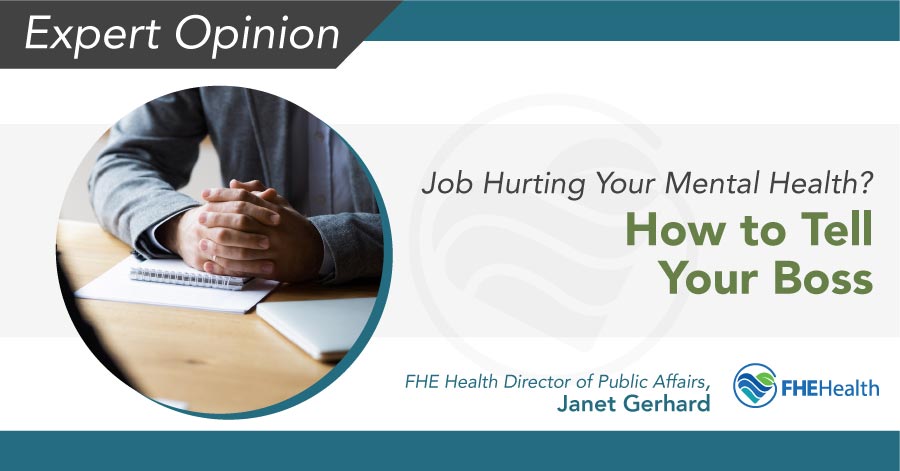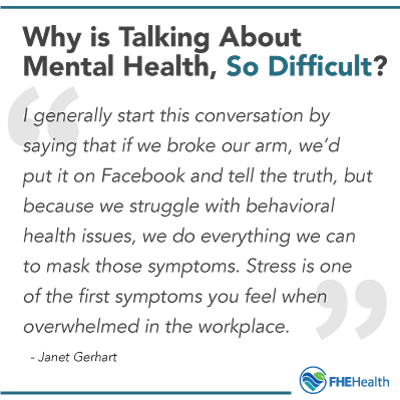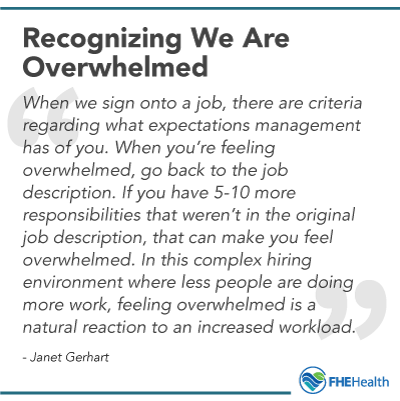
This article has been reviewed for accuracy by our peer review team which includes clinicians and medical professionals. Learn more about our peer review process.
The “Great Resignation” isn’t over. The mass exodus from work that began during the pandemic appears to be continuing. One in five workers are planning to leave the global workforce in 2022, according to the World Economic Forum, citing a survey of more than 52,000 workers in 44 countries.
Why are so many people still leaving their jobs? More work-life balance is a major reason. That begs the question: If your job is stressful or hurting your mental health but you also aren’t sure that quitting is the solution, how do you talk with your boss about what’s going on? How do you have a productive conversation that addresses your need for more work-life balance? When, too, do you determine that your mental health requires that you leave a job?
FHE Health’s Director of Public Affairs Janet B. Gerhard is used to fielding these questions. She spends a lot of time resourcing employees and their families on related issues. In a recent interview, we invited her to share some of her expertise with us.
What to Do When Your Job Harms Your Mental Health
 Stress is one of the first manifestations that a job is damaging mental health and that it is time to talk with one’s boss— but how do you have the conversation? Gerhard acknowledged it can be “complex” because of the stigma that still surrounds behavioral health issues.
Stress is one of the first manifestations that a job is damaging mental health and that it is time to talk with one’s boss— but how do you have the conversation? Gerhard acknowledged it can be “complex” because of the stigma that still surrounds behavioral health issues.
“I generally start this conversation by saying that if we broke our arm, we’d put it on Facebook and tell the truth, but because we struggle with behavioral health issues, we do everything we can to mask those symptoms. Stress is one of the first symptoms you feel when overwhelmed in the workplace.”
How to Talk with Your Boss About Stress
If you’re feeling stressed-out, you’re also not alone. “Most Americans report stress levels between 7 and 10,” Gerhard was quick to note. (In this sense, if you tell your boss you’re stressed-out, be prepared that they could respond by saying “everybody is stressed.”)
Still, “when stress is leading to days called out, problems in work relationships, or an inability to get work done, then it becomes a real work factor.” Here is where, when talking to one’s boss, “it’s important to illustrate the outcome of the stress,” Gerhard said, as in ‘the stress is making it difficult for me to _______ (concentrate/complete projects on time/work in a group setting).’”
How to Tell Your Boss You’re Overwhelmed
If you’re having symptoms like panic attacks, trouble sleeping, or problems with drugs or alcohol, you do not have to go into these details, but you can tell your boss that you are overwhelmed. Here is how Gerhard recommended going about it:
When we sign onto a job, there are criteria regarding what expectations management has of you. When you’re feeling overwhelmed, go back to the job description. If you have 5-10 more responsibilities that weren’t in the original job description, that can make you feel overwhelmed. In this complex hiring environment where less people are doing more work, feeling overwhelmed is a natural reaction to an increased workload.
Other Ways to Gauge an Unreasonable Workload?
 Gerhard said she often gets calls from people who say they are so stressed out at work and are the only one doing the work (which others are also supposed to be doing). If you find yourself saddled with duties and deadlines, you may be doing work that someone else legitimately should be doing as part of their job description.
Gerhard said she often gets calls from people who say they are so stressed out at work and are the only one doing the work (which others are also supposed to be doing). If you find yourself saddled with duties and deadlines, you may be doing work that someone else legitimately should be doing as part of their job description.
Gerhard, who frequently resources union members and their families, said that a union member who was hired at a certain classification and is now being asked to do things that fall outside that classification often can file a grievance. She added that if you are not represented by a union, it’s very hard to make that case.
How to Tell Your Boss the Workload Is Too Much
Can you be fired for telling your boss the workload is too much? “You can’t be fired for telling them the workload is too much, but you can be fired for illustrating that you can’t complete the workload,” Gerhard said. “You can say, ‘I need to complete my job description and can’t take on these additional responsibilities.’”
Is It Okay to Tell My Boss I’m Unhappy?
“Use other words than ‘unhappy,’” Gerhard advised. “The workplace isn’t there to make you happy, but you should experience happiness through your labor. if you can’t make changes to feel accomplishments that lead to happiness, then consider looking for another job.”
Your Job or Your Mental Health: How to Tell if Your Workplace Is Toxic
If your workplace is toxic, it’s possible your calculus may need to change. It is much harder to problem solve work-life balance issues with a boss when the workplace environment itself seems hostile to mental health. How do you tell if your workplace is toxic? Here is how Gerhard answered that:
We become aware of a toxic workplace when there’s a breakdown in communication—anything from those in a clique who aren’t responding to emails and leaving you out of important meetings and not including you in decision making. Toxic workplaces are defined by a breakdown of the work family. Whereas before we had mutual support from colleagues, now we work in silos; increased gossip is a factor; and increased hostility (people not giving grace to one another).
How to Tell Your Boss You’re Struggling Mentally
Should you quit your job if it is affecting your mental health? No, Gerhard said, because “there is help out there and programs available and laws that protect your job when you’re struggling with your job, like the Americans with Disabilities Act (ADA).” These provisions help to reinforce that “getting mental healthcare is as important as physical healthcare” and that “bringing yourself back into balance and continuing your professional responsibilities shouldn’t be adversarial priorities.”
If a mental health issue will require treatment or special accommodations that impact your work schedule or duties, don’t just quit— tell your boss, Gerhard advised.
“People with chronic mental health disorders are followed by a stigma that can only change if their discussions are open and honest … If there are signs and symptoms and you get treatment they’re covered under the ADA.”
In other words, be honest and direct but also brief about what you are dealing with, how you are getting help, and what accommodations you may need moving forward to be a healthy and productive employee.






